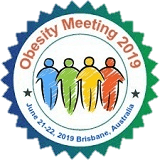
Naomi Davies
The University of Auckland, New Zealand
Title: Gut microbial predictive biomarkers of diabetes remission after bariatric surgery
Biography
Biography: Naomi Davies
Abstract
Bariatric surgery, most commonly through the Roux-en-Y Gastric Bypass (RYGB) or the Sleeve Gastrectomy (SG), results in long-term weight reduction and high rates of Type-2 Diabetes (T2D) remission. Identifying those in whom T2D is unlikely to remit after such bariatric surgery can help in prioritisation and counselling of likely benefits. The aims of this study were to identify whether any baseline gut microbial taxa predicted T2D remission after bariatric surgery and to investigate whether these corresponded to other clinical predictive factors and outcomes after surgery. Body composition data and fecal samples were collected at baseline and one-year after surgery from 44 patients who were randomised to either RYGB or SG. Diabetes remission was attained in 68% of participants undergoing RYGB or SG. At one year, total weight loss was 35.9±10.3(SD) kg, with excess weight loss (defined using reference normal BMI of 24 kg/m2) of 74.8±26%. Using shotgun metagenomic analysis we identified higher abundance Eubacteriaceae (p=0.01) and Alistipes putredinis (p=0.009) in the pre-surgery fecal samples only among those who remitted from T2D at one year. These did not relate to baseline T2D duration or insulin treatment. However, after surgery, those who remitted from T2D had significantly more abundant Roseburia (p=0.005) and Lachnospiraceae (p=0.04). These bacterial taxa also did not correlate with EWL% or T2D duration in our cohort. Although it cannot be concluded that gut microbiota are causal to T2D remission after bariatric surgery, they may be useful predictive biomarkers of future T2D status.

